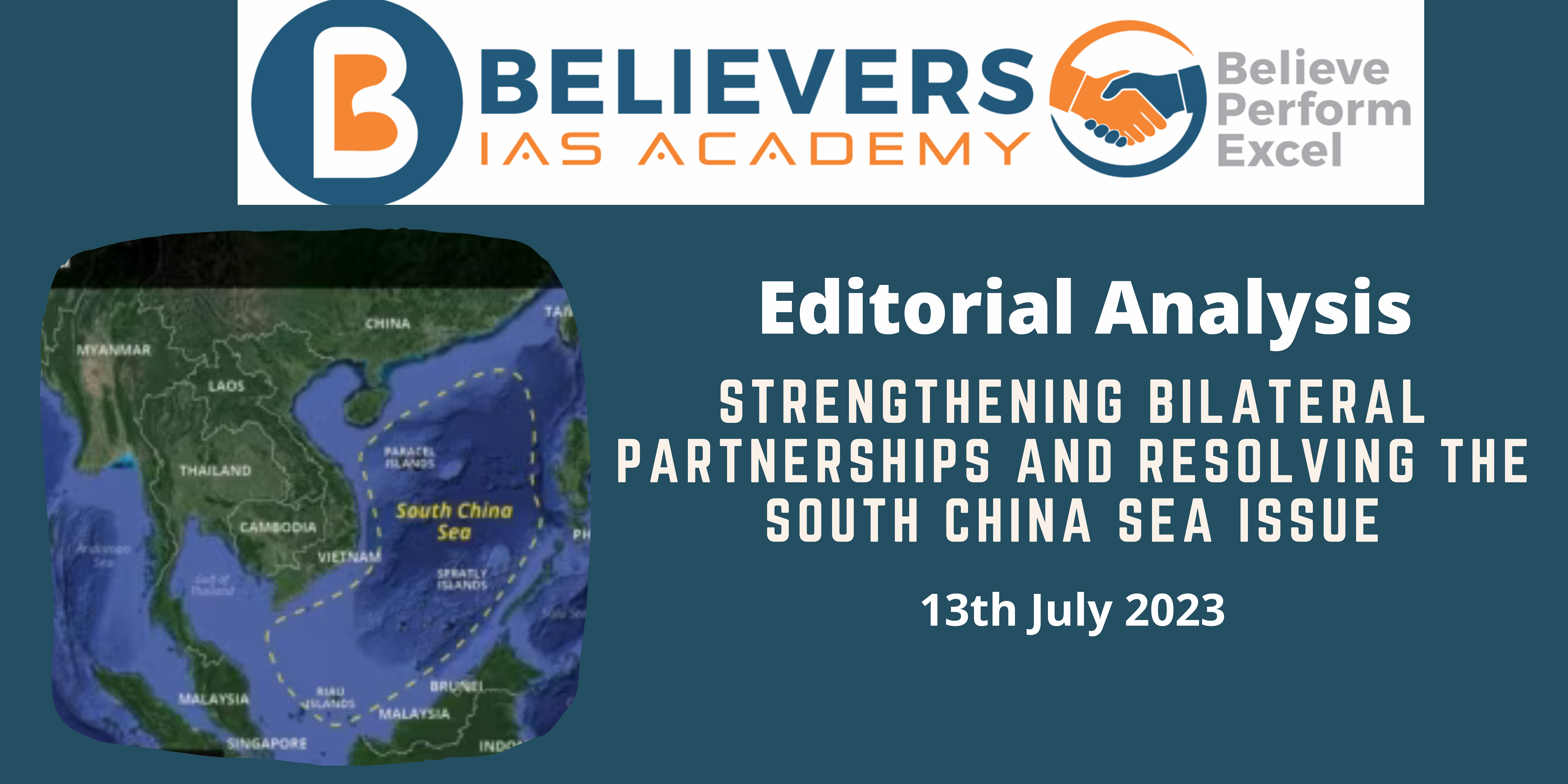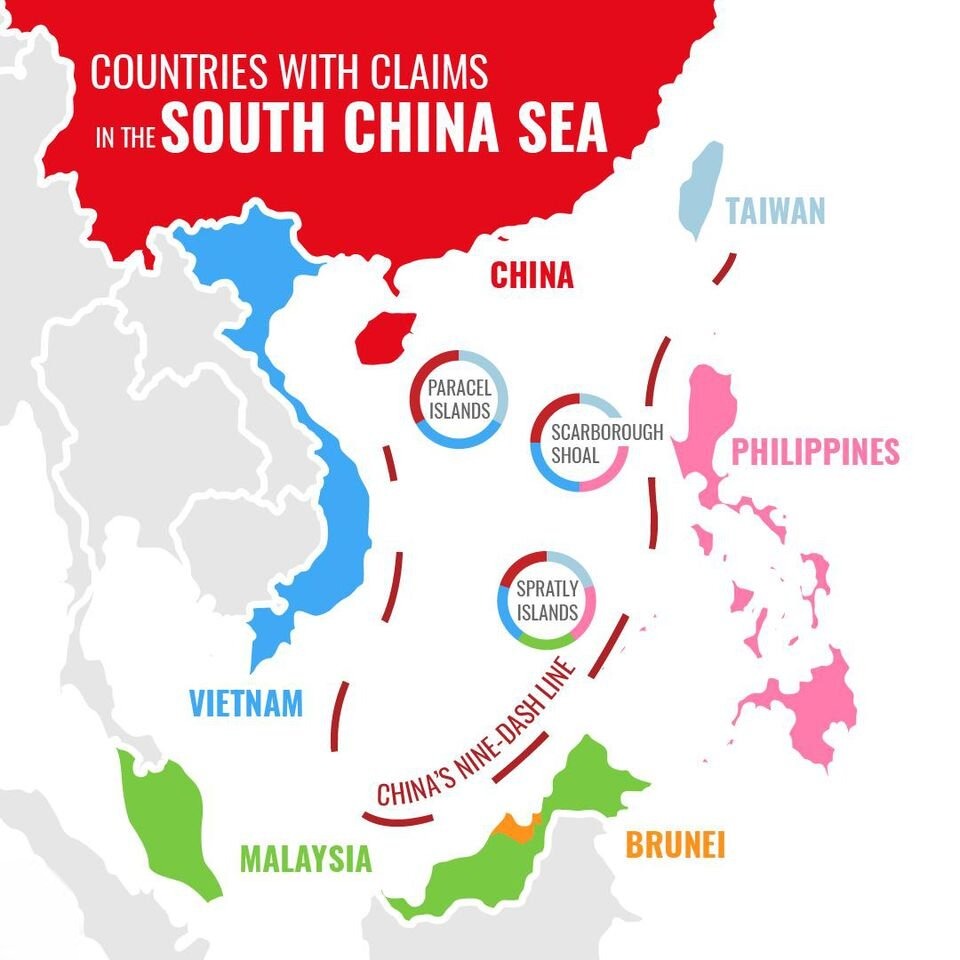Strengthening Bilateral Partnerships and Resolving the South China Sea Issue
Context:
The recent meeting between the Foreign Ministers of India and the Philippines at the fifth meeting of the Philippines-India Joint Commission on Bilateral Cooperation.
Relevance:
GS-02 (Bilateral relations, Regional groupings)
Prelims:
- United Nations Convention on the Law of the Sea
- South China Sea
- Act East Policy
- BrahMos
- ASEAN, ASEAN-India Cooperation Fund, ASEAN-India Green Fund
Mains Questions:
- Assess the importance of dialogue and political frameworks in resolving the South China Sea issue, emphasizing the role of the Association of Southeast Asian Nations (ASEAN) and the need for greater understanding among its member nations. (150 words)
Dimensions of the Article:
- Strengthening Bilateral Partnership: A Pathway to a Promising Future
- Nautical Partnership: An Evolving Strength
- India’s Shift in Stance: Upholding International Law and the 2016 Arbitral Award
- Arbitration Case: Unveiling the Verdict and Implications
- Dialogue and Political Frameworks: The Path to Peaceful Conflict Resolution
Strengthening Bilateral Partnership: A Pathway to a Promising Future
- The recent meeting between the Foreign Ministers of India and the Philippines at the fifth meeting of the Philippines-India Joint Commission on Bilateral Cooperation in New Delhi has paved the way for a strengthened bilateral partnership in the 21st century.
- The meeting, characterized by the shared interests and nearly 75 years of diplomatic history between the two maritime Asian republics, witnessed the External Affairs Minister of India, S. Jaishankar, and the Secretary for Foreign Affairs of the Philippines, Enrique Manalo, outlining a roadmap for enhanced cooperation between Manila and Delhi.
Nautical Partnership: An Evolving Strength
- The evolving strength of the nautical partnership between India and the Philippines is evident in various areas of cooperation and agreements.
- The decision to establish a resident defense attaché office in Manila signifies a deeper commitment to mutual defense and security. Additionally, the cooperation between the Coast Guards of the two countries has been boosted, facilitating joint efforts in safeguarding maritime interests.
- Manila’s acquisition of naval assets under a concessional line of credit from Delhi further underscores the growing maritime collaboration.
- Moreover, the expansion of training and joint exercises on maritime security and disaster responses, coupled with the initiation of a maritime dialogue, cements the foundation of a robust partnership.
India’s Shift in Stance: Upholding International Law and the 2016 Arbitral Award
- India’s recent position on the South China Sea issue marks a departure from its earlier stance. While reiterating its consistent adherence to international law, including the United Nations Convention on the Law of the Sea (UNCLOS), India has now unequivocally called for respect towards the 2016 Arbitral Award on the South China Sea.
- This shift signifies India’s candid recognition of the award’s legitimacy and its commitment to upholding the rule of law.
Arbitration Case: Unveiling the Verdict and Implications
- The arbitration case between the Philippines and China, submitted to the Permanent Court of Arbitration (PCA), culminated in a significant verdict with far-reaching implications.
- Despite China’s withdrawal from the arbitration proceedings, the PCA continued to adhere to UNCLOS guidelines and released the Award on July 12, 2016. The tribunal’s unanimous decision favored the Philippines, rejecting China’s historical rights claims and debunking the validity of the “nine-dash line.”
- Moreover, the tribunal found China in violation of the Philippines’ sovereign rights, particularly within its Exclusive Economic Zone (EEZ), through activities such as interfering with fishing and petroleum exploration, constructing artificial islands, and impeding the free movement of Philippine vessels.
- This landmark verdict serves as a reminder of the importance of upholding international law and respecting the rights of littoral states.
Dialogue and Political Frameworks: The Path to Peaceful Conflict Resolution
- Given the geopolitical, economic, and strategic significance of the South China Sea, it is imperative to find a political framework for resolving disputes in the region.
- The creation of such a framework, which can only be achieved through dialogue, becomes crucial. While the PCA’s decision holds legal weight, the ground reality poses challenges to its implementation. Therefore, a peaceful conflict resolution that fully respects legal and diplomatic channels, in line with the ruling, is the preferred approach.
- Leaders of the Association of Southeast Asian Nations (ASEAN) should engage in “quiet diplomacy” to seek a political solution. The progress towards a legally binding “code of conduct” in the region rests primarily on ASEAN’s shoulders.
- Strengthening understanding and unity among ASEAN member nations will enable them to effectively convey a crucial political message to China, emphasizing the importance of maintaining peace and upholding international law.
Way Forward:
- To ensure the stability and security of the South China Sea, it is imperative for nations, including India, to continue fostering robust bilateral partnerships and engaging in constructive dialogue.
- Upholding international law, respecting the 2016 Arbitral Award, and supporting ASEAN’s efforts in building a political framework are essential steps toward peaceful conflict resolution.
- By prioritizing collaboration, understanding, and adherence to legal and diplomatic channels, nations can collectively work towards safeguarding the vital marine commons and preserving global trade and economic stability.



